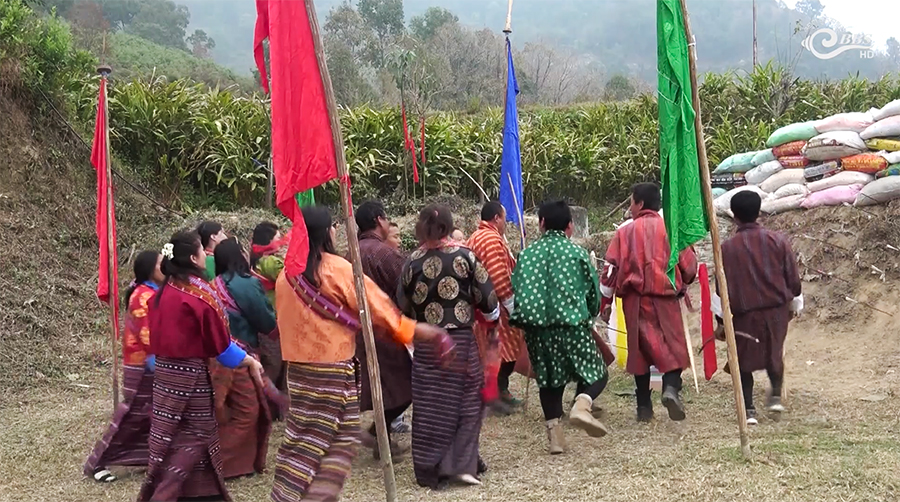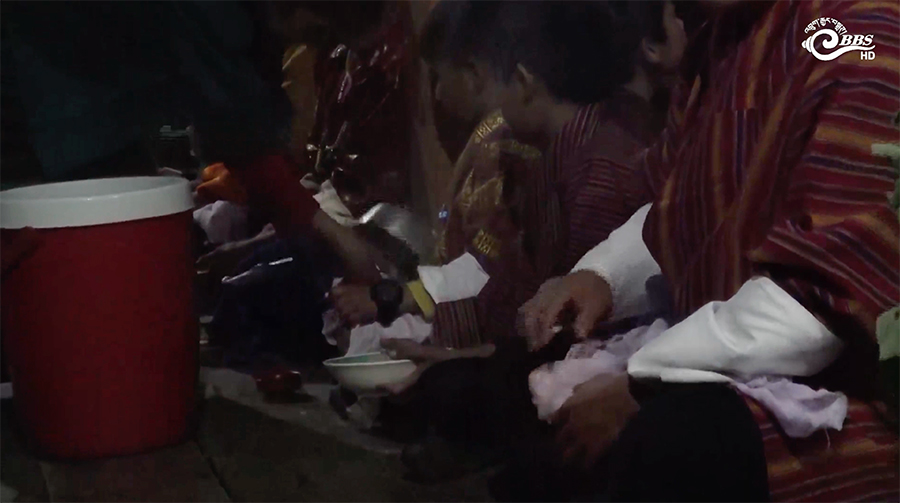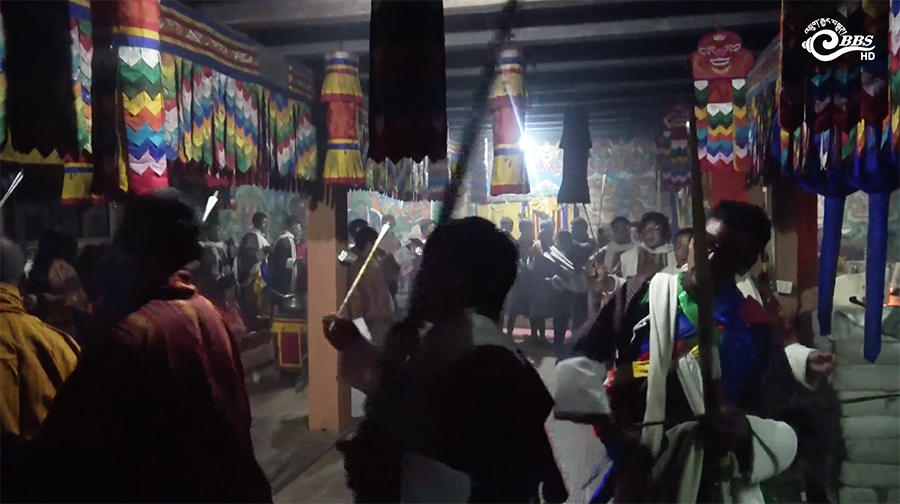 Bhutan’s deep-rooted traditions and cultural heritage continue to thrive through vibrant local festivals, preserving the nation’s unique identity. Among them, Londha, a centuries-old community archery festival at Bana Chiwog in Dagana’s Laja Gewog honours the local deity, Bana Ap, while fostering unity and cultural preservation. Over three days, villagers gather for ritual offerings, spirited archery battles, and traditional dances, reinforcing their shared identity and deep-rooted customs.
Bhutan’s deep-rooted traditions and cultural heritage continue to thrive through vibrant local festivals, preserving the nation’s unique identity. Among them, Londha, a centuries-old community archery festival at Bana Chiwog in Dagana’s Laja Gewog honours the local deity, Bana Ap, while fostering unity and cultural preservation. Over three days, villagers gather for ritual offerings, spirited archery battles, and traditional dances, reinforcing their shared identity and deep-rooted customs.
 The festivities begin at dawn. At 5 AM, participants gather at the community temple, summoned by the lead dancer known as Zhaypoen, who issues the first reminder at 4 AM and the second 30 minutes later. Those who fail to report on time are lashed with nettle plants. The event officially starts with a Marchhang, an alcohol offering to Bana Ap, followed by drinks and dances before breakfast.
The festivities begin at dawn. At 5 AM, participants gather at the community temple, summoned by the lead dancer known as Zhaypoen, who issues the first reminder at 4 AM and the second 30 minutes later. Those who fail to report on time are lashed with nettle plants. The event officially starts with a Marchhang, an alcohol offering to Bana Ap, followed by drinks and dances before breakfast.
Throughout the three-day celebration, those who break Londha rules are punished with nettle plants in keeping with their traditions. However, first-time attendees are exempted. After breakfast, archers and traditional dancers who are called Zhems move to the archery range above the Lhakhang. They perform another Marchhang offering in the range before the tournament begins, accompanied by traditional songs.
 Londha serves as a gesture of gratitude to Bana Ap for a bountiful harvest and protection from illness and misfortune while seeking blessings for the future.
Londha serves as a gesture of gratitude to Bana Ap for a bountiful harvest and protection from illness and misfortune while seeking blessings for the future.
“We contribute a portion of our annual harvest to the community temple to organise Londha. On the eve of the first day, exactly at 5 PM, we offer Marchhang to Bana Ap. After that, dancers and archers welcome Bana Ap at the Lhakhang,” Gyem Dorji, a villager.
Laja Gup Dhan Bdr. Gurung said, “Londha is a celebration of happiness that strengthens community bonds. The gewog administration and civil servants participate actively to keep this tradition alive.”
 On the first day, archers form mixed-age teams, encouraging camaraderie. The second day sees a competitive match between elderly and younger archers. The rivalry peaks on the final day when the host team faces an outsider team. This year, a team from Tsangkha Gewog participated. Traditionally, archers played barefoot, but in recent years, they have started wearing shoes for comfort.
On the first day, archers form mixed-age teams, encouraging camaraderie. The second day sees a competitive match between elderly and younger archers. The rivalry peaks on the final day when the host team faces an outsider team. This year, a team from Tsangkha Gewog participated. Traditionally, archers played barefoot, but in recent years, they have started wearing shoes for comfort.
 Adding to the excitement, the Zhems serve as cheerleaders, energising the home team with their performances.
Adding to the excitement, the Zhems serve as cheerleaders, energising the home team with their performances.
 “Only traditional bows and arrows are allowed during the festival. This is to preserve our age-old traditions. Participants must also bring Toray for meals, aligning with His Majesty The King’s focus on cultural preservation,” said Tshering Tobgay, an organiser.
“Only traditional bows and arrows are allowed during the festival. This is to preserve our age-old traditions. Participants must also bring Toray for meals, aligning with His Majesty The King’s focus on cultural preservation,” said Tshering Tobgay, an organiser.
Daw, a participant said, “Friends from other gewogs ask why we don’t allow compound bows, as they could bring in more teams and revenue. But we believe in preserving our ancestors’ legacy and passing it down to future generations.”
“This time, since some participants travelled from distant places for the archery tournament, we formed three teams. Moreover, the increase in visiting participants is helping us generate additional income for Londha through voluntary donations. Until last year, only two teams, the host and the visitors competed on the final day of the tournament,” said Namgay Tshering, a participant.
Elders recount how Bana Ap once threatened the community. A revered local Lam subdued the deity, transforming it into a protective force. Failing to organize Londha is said to bring misfortunes, as past incidents suggest.
Gyem Dorji said, “In the past, people had to stay indoors after sunset, fearing that Bana Ap might take their children. But after the arrival of the Bana Lam, the deity became our protector.”
Ugyen Dem a participant said, “Once the community has done away with the Londha celebration for a year and that year was filled with misfortunes. Leopards killed many goats and horses in the chiwog. And a strong wind destroyed our paddy fields leaving us nothing to harvest that year.”
Three villagers take turns organising Londha each year. People follow strict rules, including using traditional bows, maintaining punctuality, and eating from Torey. Interestingly, using vulgar language in front of their parents during the three-day event is not only tolerated but also encouraged, as it is believed to help ward off negative gossip and bad luck.
Londha is also celebrated in Balung and Tachey villages, and a few other gewogs in Dagana. However, participation has declined over the years as many residents live outside the district.
“As our ancestors have long celebrated Londha, I have attended for 21 consecutive years. This year, I’m an organiser. While I compete in archery, my nephews help cook for the community,” said Ugyen, another participant.
Ugyen Dem said, “We are not sure about the future, but for now, our community organises Londha without fail. Those working outside the district support us financially.”
Laja Gup added, “The Gewog administration has been emphasising the importance of preserving traditions like Londha during public engagements. While the chiwog actively participates, we must work harder to sustain this celebration for future generations.”
 As the sun sets on the final day of Londha, the sound of cheers and laughter echo through the village. With the completion of the archery tournament and the final dance, the community led by the Zhaypoen comes together for a final prayer, offering gratitude to Bana Ap for its protection and blessings.
As the sun sets on the final day of Londha, the sound of cheers and laughter echo through the village. With the completion of the archery tournament and the final dance, the community led by the Zhaypoen comes together for a final prayer, offering gratitude to Bana Ap for its protection and blessings.
In this celebration of life, tradition, and community, Bhutan’s soul shines ever bright.
Pema Tshewang, Dagana
Edited by Kipchu









